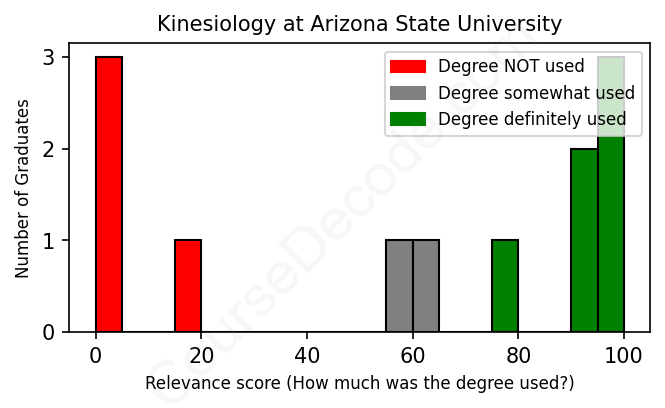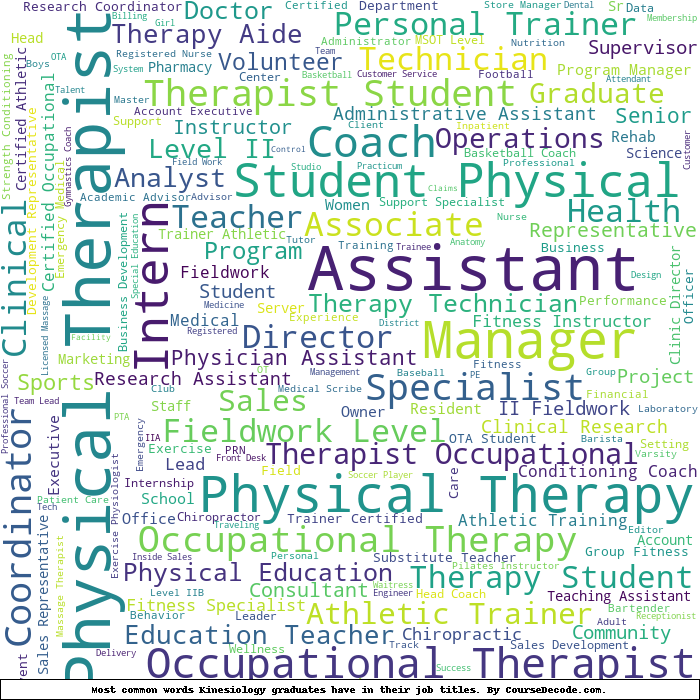
First, some facts. Of the Kinesiology graduates from Arizona State University we've analyzed , here's how many have used (or NOT used) their degree in their career:

These are estimates based on AI analysis of 12 LinkedIn profiles (see below).
The verdict? Below average. Overall, with an average relevance score of 57%, Kinesiology graduates from Arizona State University have a lower likelihood (-10%) of finding work in this field compared to the average graduate across all fields:
And for comparison, here's the chart for all profiles we've looked at across all degrees.
Also, after graduating, 66% of these graduates have pursued further education other than another Bachelor's degree (such as a Masters degree or other), compared to the average across all profiles of 35%. This suggests you may need more than just a Bachelors degree to be competitive as a Kinesiology graduate.
See the details:
|
Relevance score: 77% We think this person has gone into a career highly relevant to their degree. We think this person has gone into a career highly relevant to their degree.
DEGREE INFOGraduated in 2013 from Arizona State University with a Bachelor of Science (B.S.) in Kinesiology. Also pursued further education since (see below). JOB HISTORY SINCE GRADUATIONEmergency Department Volunteer Maricopa Integrated Health System Mar 2013 - Mar 2015 Documentation Specialist  Augmedix 2015 - 2015 Documentation Specialist  Augmedix 2015 - 2015 Medical Scribe  Augmedix Jan 2015 - Aug 2015 Emergency Department Medical Scribe  Medical Scribe Systems Jun 2013 - Aug 2016 Lead Scribe  HonorHealth Jan 2016 - Aug 2016 Physician Assistant  Mayo Clinic Sep 2020 - Present FURTHER DEGREES DONE SINCE GRADUATINGMaster of Arts - MAMidwestern University (AZ) 2016 - 2017 MPAS Northern Arizona University 2018 - 2020 ABOUTNo information provided. |
The top 10 most common jobs done by the graduates we've analyzed (ranked most common to least) are:
After looking at the job profiles of people who graduated with a degree in Kinesiology from Arizona State University, it seems like a mixed bag in terms of how aligned their careers are with kinesiology. The most common jobs are in physical therapy roles, such as Physical Therapy Assistants and Physical Therapists, which make great use of the knowledge gained in their Kinesiology programs. These positions directly involve understanding human movement and rehabilitation techniques, so they’re definitely relevant. On the flip side, there are quite a few graduates who have gone into sales and administrative jobs—like Sales Representatives or Claims Associates—where the connection to kinesiology is pretty much non-existent. These positions are more focused on general business skills rather than any specialized knowledge related to human health or movement.
In general, while there’s a strong presence of graduates working in health and wellness fields, others have ventured far from the core principles of their Kinesiology degree. A good chunk has taken roles as Physical Therapy Technicians or even sports-related positions that really tap into what they learned in school. However, it’s worth noting that many have also gravitated toward careers that don’t utilize their kinesiology expertise at all. This indicates that, while a degree in Kinesiology can lead to some truly relevant and impactful careers, it also opens doors to various paths, many of which aren’t related to the field. So if you’re considering a degree in Kinesiology, be aware that your future career could really vary based on what you choose to focus on after graduation.
Here is a visual representation of the most common words in job titles for Kinesiology graduates (this is across all Kinesiology graduates we've analyzed, not just those who went to Arizona State University):

From analyzing the career trajectories of Kinesiology graduates from Arizona State University, it seems there's a mix of success and shifting paths over time. Many graduates start off in roles that are somewhat related to their field, like Physical Therapy positions or healthcare roles, especially within the first few years post-graduation. For instance, a number of graduates from the class of 2013 transitioned into Physician Assistants or Physical Therapists, which is a strong direction considering they are relevant to Kinesiology. This indicates that early career opportunities often align with their academic background, showcasing that a degree in Kinesiology can lead to good roles in health and wellness.
However, as we look at individuals five to ten years out, there's noticeable diversity in career paths. Some have advanced within healthcare, moving into director or ownership roles in therapy clinics, while others have pivoted completely away from the field, landing in jobs like sales or recruiting. For example, one graduate's career took them from being a Physical Therapist to becoming a Talent Acquisition Specialist after running their own physiotherapy business for several years. This suggests that while many graduates start strong in relevant roles, the long-term career satisfaction and relevance can vary widely, with some choosing to explore different industries entirely.
Getting a Bachelor's degree in Kinesiology at Arizona State University can be a bit of a mixed bag. It’s not the hardest degree out there, but it's definitely not a walk in the park either. You’ll be covering a lot of science-based topics, like anatomy and physiology, which can get pretty intense if science isn’t your thing. On the flip side, many students find the hands-on experiences and practical applications really engaging. Overall, if you’re passionate about health and movement, and you stay on top of your studies, it can be manageable and even enjoyable. Just be ready to put in some effort and time!
Most commonly, in the LinkedIn profiles we've looked at, it takes people 4 years to finish a Bachelor degree in Kinesiology.
Looking at these Kinesiology grads from Arizona State University, it seems like a mixed bag when it comes to making decent money. Some, like the Physical Therapists and Physician Assistants, are probably pulling in a good salary since those roles typically pay well, especially as they gain experience—like the Clinic Director who owned a business for a while. However, others, like the Sales Representatives and newer graduates in entry-level positions, might still be working their way up the ladder and aren’t likely raking it in just yet. Overall, if they stick to their fields and climb the ranks, a lot of them could end up doing pretty well financially, but some seem to be in roles that might not offer the best pay right now.
Here is a visual representation of the most common words seen in the "about" section of LinkedIn profiles who have a Bachelor degree in Kinesiology (this is across all Kinesiology graduates we've analyzed, not just those who went to Arizona State University). This may or may not be useful:

Here are all colleges offering a Bachelor degree in Kinesiology (ordered by the average relevance score of their Kinesiology graduates, best to worst) where we have analyzed at least 10 of their graduates:
| College | Score | Count |
|---|---|---|
 Penn State University Penn State University
|
72 | 12 |
 Arizona State University Arizona State University
|
57 | 12 |